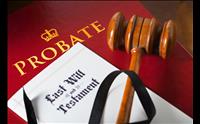When someone passes away it is naturally quite a difficult time for the family emotionally. There are often a lot of questions regarding their estate, especially early on in the Probate/Estate Administration process.
Below are a few of the most common estate administration questions that we are often asked:
Common Question # 1: "As Executor, Am I Liable For The Debts Of The Estate Of The Person Who Passed?"
When bills start coming in after a death, the executor may worry about being liable for the deceased person’s debts. However, in most situations, you’re not required to use your own money to pay those estate debts. Debts that the deceased person incurred while they were alive, or expenses that the estate has after the death—should be paid for with estate assets. For example, if the deceased person left a checking or savings account, the executor should transfer those funds into an estate bank account and use that money to pay bills.
Common Question # 2: "What If There Isn’t Any Cash Readily Available And Bills Have To Be Paid Immediately, What Do I Do?"
In these situations, then the executor or family members may need to go ahead and pay some bills from their own funds in the meantime. One example of this would be that you might need to pay burial or cremation expenses right away. Keep careful track of how much you spend, what you spend it for, and when you spend it. As long as you keep good records, and that expense was necessary, you can reimburse yourself from the estate funds for that later.
Common Question #3: "What If The Estate Was Small, And I Am Not Sure There Will Be Enough Funds Available To Pay Every Debt Incurred By The Deceased?"
If you suspect that there aren’t enough estate funds to pay the deceased person’s debts, exercise caution about paying for anything, with either your own money or estate funds. Remember that under state law, creditors will have up to a year in some states to come forward with their claims to be paid. State law sets out the priority in which debts should be paid; creditors placed at the bottom of that list will simply be out of luck. And if you pay out money from the estate to creditors who aren’t entitled to receive it, you might indeed have to reimburse the estate for the loss that you caused it!
Common Question #4: "Am I Responsible For Paying My Late Mother's Or Father's Credit Card Debt?"
Let's say your mother passed away with very little money and a lot of debt. She named her adult child (you in this example) as executor in her will. The bank that issued her credit card has been calling you repeatedly and asking what arrangements you are going to make about getting her debt paid. Are you responsible for her debts?
The answer in this scenario here is that you are not personally responsible for her debts—and don’t let the credit card company pressure you into taking on this debt! If there’s enough money in your mother’s estate to pay all your mother’s debts, then it’s your legal responsibility to pay them from the estate. If there isn’t enough money to go around, then state law sets out the priority for paying debts. In most states, credit cards fall towards the bottom of the pile in terms of priority, below funeral expenses, attorneys’ fees, taxes, and other obligations.
Common Question #5: "If I Am The Surviving Spouse, Am I Personally Liable For The Deceased Spouse's Debts?"
In some situations, survivors may be personally liable for debts of the deceased person. Surviving spouses are liable for debts that the couple incurred together. For example, the survivor will be responsible for charges on a joint credit card, no matter which spouse actually charged the purchase. If the deceased spouse incurred a debt alone, though, the survivor may not be liable. It depends on state law, the nature of the debt, and how that couple owned property together. For example, creditors owed money by only one spouse could probably go after the deceased spouse’s half of property that the couple owned together. But if the couple owned property "as tenants by the entireties," (allowed only in some states), then creditors could not reach that property for payment of the debts of just one spouse.
Common Question #6: "If I Was Cosigner On A Loan Or A Line Of Credit Issued To The Deceased - Am I Liable?"
If someone cosigned for a loan or line of credit issued to the deceased person, the cosigner will be liable for the debt if the assets of the deceased person don’t cover it. That’s what cosigning is—promising to make good on a debt if the primary borrower, for whatever reason, is not able to do so.
Common Question #7: "What If The Executor Causes The Estate To Lose Money? Is The Executor Liable For That?"
If the executor is careless or dishonest while in charge of the estate assets, and the estate loses money as a result, the executor may be on the hook for certain debts. For example, say the executor, without waiting to add up the estate’s debts and assets, quickly pays a large credit card bill of the deceased person. Later, it turns out that the estate doesn’t have enough money to pay all of its debts—and some unpaid bills, including expenses of the last illness, have higher priority under state law than does credit card debt. The executor will probably have to reimburse the estate for the amount of money paid to the credit card issuer.
These are just a few of the most common estate administration questions we are asked. For more information on the estate administration process, book a call with one of our staff members or give our office a call. We have offices located in Bassett, Danville, and Lynchburg to better serve you!



